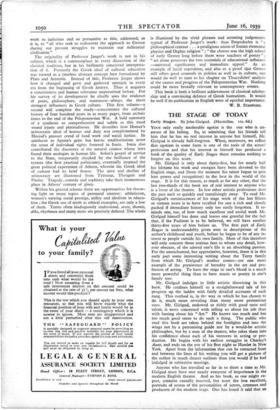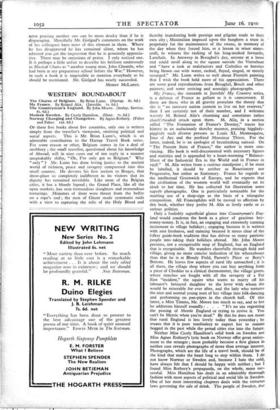THE STAGE OF TODAY
Early Stages. By John Gielgud. (Macmillan. 12s. 6d.) YOUR only really intolerable egotist is the one who is un- aware of his failing. So, in admitting that his friends tell him that he has no real interest in anyone but himself, Mr. Gielgud is already half-forgiven. When, moreover, we reflect that egotism in some form is one of the tools of the actors' profession and that his interest in himself has produced a book of the quality of Early Stages there remains nothing to forgive on this score.
Mr. Gielgud is only about thirty-five, but for nearly half his lifetime his work and energies have been devoted to the English stage, and (from the moment his talent began to gain him power and recognition) to the best in the world of the stage. It is for this reason, as much as for any other, that the last two-thirds of the book are of real interest to anyone who is a lover of the theatre. In few other artistic professions does the past melt so quickly and tantalisingly away. To read Mr. Gielgud's reminiscences of his stage work of the last fifteen or sixteen years is to have recalled for one a rich and closely packed if immediate history only too easily forgotten. It re- minds one, too, of how much excellent and useful work Mr. Gielgud himself has done and leaves one grateful for the fact that, if the Psalimst is to be believed, we still have another thirty-five years of him before us. The first part of Early Stages is understandably given over to descriptions of the author's childhood and youth, before he began to be of any in- terest to people outside his own family. Most of this therefore will only concern those zealous fans to whom any detail, how- ever obscure, of the adored one's life is an absorbing passion. For the unenchanted, but appreciative, however, there is in this early part some interesting writing about the Terry family from which Mr. Gielgud's mother comes—yet one more example of the persistence of heredity in the art and pro- fession of acting. To have the stage in one's blood is a much more powerful thing than to have music or poetry in one's family tree.
Mr. Gielgud indulges in little artistic theorising in this book. He confines himself to a straightforward tale of his progress up the ladder with fairly detailed accounts of each rung. This method is, in the way in which he has chosen to do it, much more revealing than many more pretentious ones. Mr. Gielgud, endowed so richly with good taste and talent, is more concerned with telling us about his job than with fussing about his " Art." He knows too much and has too much good sense to do such a thing. The public who read this book are taken behind the footlights and into the wings not by a patronising guide nor by a would-be artistic philosopher, but by a man of the theatre, who takes them into his confidence about each of his ventures in acting or pro- duction. He begins with his earliest struggles in Charley's Aunt, and ends on the eve of his first night as Hamlet in New York. Apart from the information that can be extracted from and between the lines of his writing you will get a picture of the author in much clearer outlines than you would if he had indulged in subjective musings.
Anyone who has travelled so far in so short a time as Mr. Gielgud must have met nearly everyone of importance in the modern English theatre And so his book, as one might ex- pect, contains casually inserted, but none the less excellent, portraits of scores of the personalities of actors, actresses and producers of the modem stage. One has heard it said that an
actor praising another one can be more deadly than if he is disparaging. Mercifully Mr. Gielgud's comments on the work of his colleagues have none of this element in them. Where he has disapproved he has remained silent, where he has admired you get the impression that he is genuinely apprecia- tive. There may be omissions of praise. I only noticed one. It is perhaps a little unfair to describe his brilliant understudy in Musical Chairs as " another young man, John Cheattle, who had been at my preparatory school before the War." However, in such a book it is impossible to mention everybody as he should be mentioned. Mr. Gielgud has nearly succeeded.
MORAY MCLAREN.























































 Previous page
Previous page